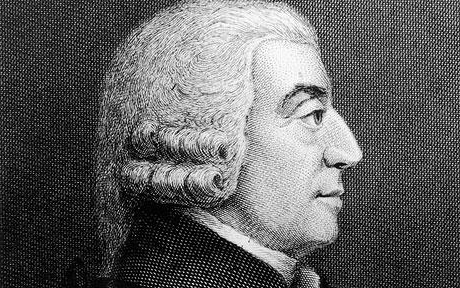The Wealth of Nations, 240 years on
On this day in 1776, exactly 240 years ago, the Scottish philosopher Adam Smith finally published his best-known work, An Inquiry Into The Nature And Causes Of The Wealth Of Nations – the book which Smith himself called his Inquiry but which is known to us today as The Wealth of Nations. It was fifteen years in the making. So long, indeed, that Smith’s friends eventually ganged up on him and urged him to finish it before someone else did the job for him. The final chapters (gleefully cited by Owen Jones in his talk to the Adam Smith Institute’s Next Generation Group last night) in which Smith talks about the need for governments to subsidise education and other services, show every sign of being rushed and given less of the lengthy consideration that he gave to earlier chapters.
Perhaps too much consideration, in fact. “It is a clumsy, sprawling, elephantine book,” wrote Leo Rosten; and he is not wrong. One “digression” alone, on the price of silver, takes up 70 pages, fully a tenth of the whole work. Smith seems to have found a place in it for every stray fact that came into his capacious mind – from the diamond mines of Golconda through the fisheries of Holland to the market for Irish prostitutes in London. As if that were not exhausting enough, even native English speakers have difficulty with the studiously elegant, but now very dated language; to others, it is unreadable, or nearly so.
It is for these reasons that I wrote The Condensed Wealth Of Nations. But that is not to downplay Smith's magnum opus. It is in every sense a great book. Some modern critics say that much of The Wealth of Nations was not original. But Smith’s achievement was to take the disparate ideas and facts in circulation at the time and weave them into a coherent intellectual system – indeed a new science, of economics. Overcrowded with facts it may be, and yet (as Joseph Schumeter remarked) it “lights up the mosaic of detail, heating the facts until they glow,” making it (says Rosten) "one of the towering achievements of the human mind: a masterwork of observation and analysis, or ingenious correlations, inspired theorising, and the most persistent and powerful cerebration.”
Yet Smith did not see his Inquiry as a mere textbook. It was a polemic against the suffocating regulations on trade and commerce in his time. Monarchs granted their friends monopolies, even in essential goods. The guilds restricted entry to every profession – and kept up prices. Exports were subsidised and imports were restricted because it was thought that the wealth of a nation was the amount of gold and silver it could get into, and keep, in its vaults. But Smith, audaciously, pointed out that both sides benefit from a voluntary exchange: they would not bother if they didn’t. Buyers may end up with less money, but they get, in return, goods or services they value more. Any restriction on trade necessarily reduces the value that such free exchange generates for both sides.
The Wealth Of Nations was hugely influential; the leading politicians on both sides of the Atlantic all read it, and took its advice. Taxes and tariffs were cut, monopolies and restrictions abolished, and the world enjoyed a century of free trade, enterprise, innovation, growth, and improvement. Too often today, we forget Smith’s advice; but it remains there to guide us. It is a book that has profoundly shaped our world.

